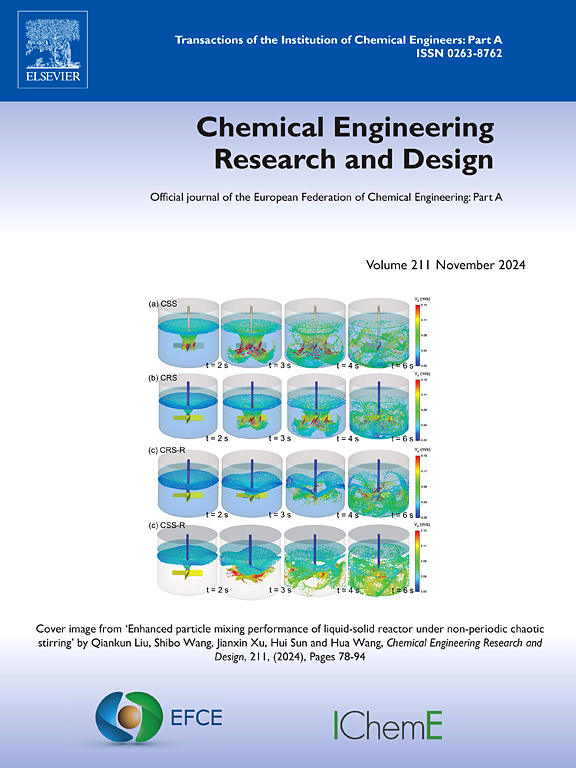Feature-based scenario clustering and selective degrees of freedom reduction for two-stage stochastic optimization of Power-to-Methanol
IF 3.9
3区 工程技术
Q2 ENGINEERING, CHEMICAL
引用次数: 0
Abstract
Power-to-X processes can be operated flexibly to exploit electricity price fluctuations or renewable power availability, reducing production costs. Ideally, the process design should be optimized simultaneously with the scheduling or operation. To address the uncertainty in electricity prices or availability, several scheduling scenarios can be simultaneously considered in two-stage stochastic optimization problems. However, these problems, especially when nonlinear, become challenging to solve when the scenario number and scheduling horizon increase.
To tackle this challenge, we combine feature-based scenario clustering with reducing the degrees of freedom (DoF) related to the scheduling variables. The latter maintains time step chronology memory, thus ensuring optimal solution feasibility even if storage is present. For a Power-to-Methanol process, we show that DoF reduction should not be applied to all scheduling variables when there is intermediate storage, since it strongly correlates the variables, thus affecting the optimal process design. In a sensitivity analysis concerning the scenario cluster number, we show that scenario clustering based on interpretable features can represent the original space and estimate the objective function with a few scenarios, performing similarly to k-means and k-medoids clustering regarding the objective function. However, despite similar objective values, different optimal designs are identified for different scenario cluster numbers.

基于特征的情景聚类和选择性自由度缩减的两阶段随机优化
power -to- x工艺可以灵活操作,利用电价波动或可再生能源的可用性,降低生产成本。理想情况下,工艺设计应与调度或运行同时优化。为了解决电力价格或可用性的不确定性,两阶段随机优化问题可以同时考虑多个调度方案。然而,随着场景数量和调度水平的增加,这些问题的解决变得越来越困难,尤其是非线性问题。为了应对这一挑战,我们将基于特征的场景聚类与减少与调度变量相关的自由度(DoF)相结合。后者保持时间步长时间存储器,从而确保最优解决方案的可行性,即使存储存在。对于电力制甲醇工艺,我们表明,当存在中间存储时,DoF还原不应应用于所有调度变量,因为它与变量强烈相关,从而影响最优工艺设计。在对情景聚类数的敏感性分析中,我们发现基于可解释特征的情景聚类可以用几个场景表示原始空间并估计目标函数,其性能类似于k-means和k-medoids对目标函数的聚类。然而,尽管目标值相似,但对于不同的场景簇数,确定了不同的最优设计。
本文章由计算机程序翻译,如有差异,请以英文原文为准。
求助全文
约1分钟内获得全文
求助全文
来源期刊

Chemical Engineering Research & Design
工程技术-工程:化工
CiteScore
6.10
自引率
7.70%
发文量
623
审稿时长
42 days
期刊介绍:
ChERD aims to be the principal international journal for publication of high quality, original papers in chemical engineering.
Papers showing how research results can be used in chemical engineering design, and accounts of experimental or theoretical research work bringing new perspectives to established principles, highlighting unsolved problems or indicating directions for future research, are particularly welcome. Contributions that deal with new developments in plant or processes and that can be given quantitative expression are encouraged. The journal is especially interested in papers that extend the boundaries of traditional chemical engineering.
 求助内容:
求助内容: 应助结果提醒方式:
应助结果提醒方式:


